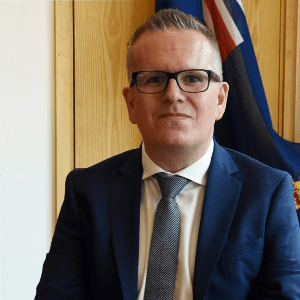Maritime and Coastguard Agency (MCA) - Experts & Thought Leaders
Latest Maritime and Coastguard Agency (MCA) news & announcements
The Maritime Technologies Forum (MTF) has released a new report offering key recommendations to consider as the industry looks to adopt onboard carbon capture and storage (OCCS) technology. The report highlights the regulatory and safety considerations for the adoption of onboard carbon capture while also recognising the importance of developing a secure and scalable downstream carbon value chain and increasing carbon capture system cost-effectiveness. Key recommendations Based on the findings of the publication, MTF has outlined the following key recommendations, including: Collaborate to create a secure downstream value chain comprising of CO2 offloading facilities, transport infrastructure and long-term storage, together with associated MRV schemes, with the goal of permanently storing captured CO2. Establish clear and consistent regulations on safety and environmental performance, which include: Develop safety guidelines specifically for OCCS, covering aspects like equipment design, risk assessment, and emergency response procedures. Consistently incorporate OCCS into existing regulations, such as the EEDI, EEXI and CII as well as the EU ETS and FuelEU Maritime measures. Develop certification schemes for downstream CO2 value chain infrastructure. Define acceptable levels of CO2 impurities and develop standardised guidelines for safe CO2 handling, including offloading procedures and port infrastructure requirements. Amend the Safety Management Systems and develop specialised training programs for crew members covering the operation, maintenance and emergency procedures for OCCS systems. Focus on the development of OCCS technologies to increase CO2 capture rates, reduce energy demand, and, thus, increase cost-effectiveness and demonstrate OCCS systems in pilot projects to gather operational experience. Various variables and challenges Commenting on the recommendations, Lars Lippuner, UK Maritime and Coastguard Agency (MCA) Director of UK Customer Maritime Services, said: “This report identifies the various variables and challenges that are impacting broad adoption of onboard carbon capture, including the need for a downstream carbon value chain." "These recommendations will help establish a robust framework for standards and requirements.” Net-zero emissions goals Further commenting on the report, Christopher J. Wiernicki, ABS Chairman and CEO, said: “Carbon capture is shaping up to be a key transformational technology and enabler for shipping to achieve its net-zero emissions goals." "The recommendations outlined in this latest report offer important steps for industry and regulators to consider, helping support the safe and efficient adoption of onboard carbon capture.”
3t, the UK-based global pioneer in safety-critical training, had the honour of hosting senior officials from the Maritime and Coastguard Agency (MCA) at its state-of-the-art training centre in Dyce, Aberdeen. The visit centered on strategic discussions about upskilling the maritime workforce to meet the evolving demands of traditional energy sectors and the emerging marine renewables industry. Maritime safety and workforce As part of the MCA’s global remit to support maritime safety and workforce development across borders, the delegation was headed by Chair Lord Simon Stevens and CEO Virginia McVea, accompanied by key senior figures such as Fraser Heasley, Director of UK Technical Maritime Services; Lars Lippuner, Director of UK Customer Maritime Services; and Dr. Rannia Leontaridi, Director General of the Aviation, Maritime, and Security Group from the Department for Transport. Their visit focused on critical global issues, including vessel decarbonisation, port infrastructure development, and strengthening the maritime workforce for North Sea operations, including lifeline ferry services and the fishing industry. Energy transition The MCA delegation explored 3t’s immersive learning experiences including various technologies CEO, Kevin Franklin, Vice President for Training, Paul Knowles, and the MCA delegation engaged in productive discussions on the skills and workforce adjustments needed globally to support the energy transition and growing renewable sectors, before enjoying a tour of 3t’s state-of-the-art training facilities in Dyce, Aberdeen. The MCA delegation explored 3t’s immersive learning experiences including various technologies designed to enhance the delegate experience and bolster learning outcomes. During the visit, the officials were introduced to 3t’s advanced training technologies, including the lifeboat simulator and sea survival programs at the centre’s dedicated marine training facilities. State-of-the-art training The delegation was also briefed on the critical role of 3t’s Quayside operations, which deliver essential maritime-specific training, such as lifeboat launch procedures, safety at sea, and rigging and lifting - key skills for offshore energy projects. 3t offers an extensive portfolio of over 600 different training courses at 16 global centres, training individuals to the highest industry standards annually issuing 200,000 certificates per year. Simulators, virtual reality, and digital twin Its training is enhanced by advanced learning technologies, including state-of-the-art simulators Renowned for its exceptional service quality, 3t has cultivated long-standing relationships with clients. Its training is enhanced by advanced learning technologies, including state-of-the-art simulators, virtual reality, and digital twin technology, alongside a variety of blended learning solutions. Kevin Franklin, CEO of 3t, said, “We were honoured to host the Maritime & Coastguard Agency at our Dyce training centre, a pivotal opportunity to showcase our world-class facilities and discuss essential workforce upskilling." Technology-driven training solutions “3t’s roots in maritime training, combined with our extensive international footprint, enable us to support the growing demand for skilled workers not only in renewables but across the full spectrum of the maritime and energy sectors." “Our facilities and technology-driven training solutions ensure we maintain a highly skilled workforce ready to meet the needs of both traditional energy roles and emerging marine renewables. We look forward to continued collaboration with the MCA to secure a sustainable and skilled future for the global maritime industry.”
Hartnell Taylor Cook has announced that following a competitive tender, it has been re-appointed to manage the Maritime and Coastguard Agency’s (MCA) Estate Management Services contract. The new contract period commenced in April, for up to a 5-year period, building on a long-standing relationship spanning over two decades. The contract was procured under the Crown Commercial Services framework (RM6168), where Hartnell Taylor Cook is appointed under a number of “Lots”. Maritime Rescue Centres Hartnell Taylor Cook will continue to provide support with a wide range of real estate management advice, including all aspects of lease consultancy, agency, building consultancy, and strategic planning. They also provide MCA with a full treasury management function. MCA’s estate is dispersed across the UK and comprises a varied and complex property portfolio; ranging from manned Maritime Rescue Coordination Centres to unmanned Coastguard Stations and radio sites. Unique logistical challenge These assets are often located in geographically difficult-to-reach areas and extremities of the UK These assets are often located in geographically difficult-to-reach areas and extremities of the UK, posing a unique logistical challenge that Hartnell Taylor Cook is well-experienced in dealing with owing to its 23-year relationship with MCA, evidencing the capability to deliver on-site surveys and advice across the entire UK geography, including its islands. As part of upholding quality service delivery, Hartnell Taylor Cook’s management team has remained as consistent as possible, with the Property and Asset Management Director Mansel Hughes pioneering the day-to-day MCA services since 2007 and Partner, Jonathan Marwood, overseeing the contract since its original commencement. MCA’s large portfolio Commenting on the re-appointment, Jonathan Marwood, Partner at Hartnell Taylor Cook, said: "We are delighted to be able to continue managing MCA’s estates and view the re-appointment as testament to our longstanding and robust partnership to date." He adds, "We are thrilled to be able to continue our successful delivery of services for MCA’s large portfolio across the UK and its islands and are looking forward to our relationship continuing from strength to strength."











